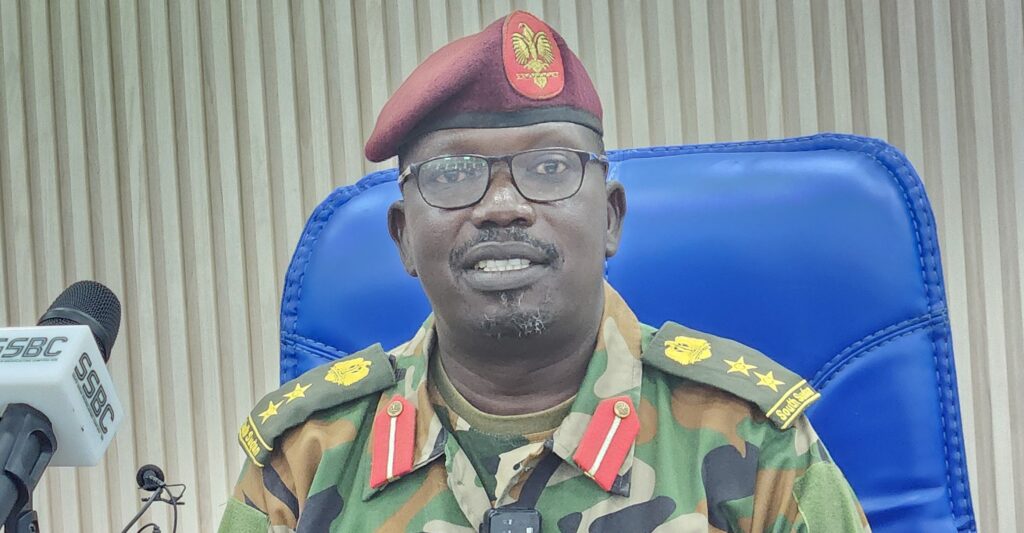The Sudan People’s Liberation Army in Opposition (SPLA-IO) accused the South Sudan People’s Defense Forces (SSPDF) on Thursday of using the dismantling of checkpoints as a way to expand their territorial control.
Clashes have recently occurred between the two groups in Western Equatoria and Western Bahr el Ghazal states over the removal of illegal checkpoints, as directed by President Salva Kiir.
South Sudan has yet to fully reintegrate and unify its various armed forces, as required by the 2018 peace agreement.
The SSPDF is commanded by President Sava Kiir, while SPLA-IO forces are under the command of First Vice President Riek Machar.
South Sudan, which gained independence from Sudan 13 years ago, was soon plunged into civil war after Kiir and Machar fell out. After five years of conflict, the two leaders signed a power-sharing agreement, though its implementation has faced numerous challenges.
In a press conference in Juba, Col. Lam Paul Gabriel, spokesperson for the SPLA-IO, said the group does not oppose the closure of illegal checkpoints but faces challenges in agreeing with the SSPDF on how to dismantle them.
“We are not against the dismantling of illegal checkpoints, but the unification of forces has not yet been completed. There are still areas controlled by the SPLA-IO designated as assembly areas. The checkpoints in these areas serve primarily for security purposes, not for taxation,” he said.
“The agreement does not grant unilateral authority to the SSPDF to dictate terms in SPLA-IO-controlled areas. Therefore, the SSPDF has used the resolution from the Governors’ Forum as an excuse to expand their territory and undermine the SPLA-IO’s assembly areas, which is a clear violation of the permanent ceasefire,” Lam added.
Gabriel also highlighted the breach of the Revitalized Agreement on the Resolution of the Conflict in South Sudan (R-ARCSS), specifically referencing Article 2.1.10.4, which prohibits offensive, provocative, or retaliatory actions, including hostile propaganda, recruitment, mobilization, and redeployment of forces. Such actions, he said, must be communicated to the Ceasefire and Transitional Security Arrangements Monitoring and Verification Mechanism (CTSAMVM).
“This article has been completely violated by the SSPDF, starting in early January when they deployed at the Bou Bridge, and continuing through yesterday, February 12, 2025, when they attacked the Rirangu cantonment site,” Lam said.
Accusations of Attack
Lam further accused the SSPDF of attacking an SPLA-IO position in Western Equatoria. He said SPLA-IO forces at Rirangu, commanded by Brig. Gen. James Nando, came under attack on Wednesday.
The SPLA-IO was forced to withdraw to a safer location, but no casualties were reported, Lam said.
“In a Joint Defense Board (JDB) meeting on February 12, 2025, the SSPDF denied their involvement in the clashes, labeling the incident as a tribal conflict between the Azande and Balanda tribes. However, a video taken at the cantonment site shows Brig. Gen. James Nando, along with his bodyguards, celebrating the capture of the Rirangu cantonment site by the SSPDF,” Lam explained.
He also clarified the situation regarding the former governor of Western Equatoria, stating that he is now back at the military base. The former governor, who had served as the sector commander of Western Equatoria, was attacked shortly after his removal from office.
“The former governor is safe and in communication with the chairman. Before becoming governor, he was the sector commander of Western Equatoria, where all SPLA-IO forces in Western Equatoria state were under his command. After being relieved of his gubernatorial duties, he returned to our base. We hope this situation can calm down so that he can come to Juba. The attack on his residence was a planned attempt on his life, but thankfully, he survived,” Lam said.
Security Arrangements
Lam also addressed the issue of security arrangements, accusing the SSPDF and President Kiir’s camp of violating the security arrangements by recruiting forces without proper consultation.
“The Graduated Necessary Unified Forces (NUF) have not been deployed, except for the army. All security units loyal to the SPLM and ITGoNU [Previous government] are actively recruiting, training, graduating, and deploying new forces in direct violation of the agreement, as stipulated in Article 4,” he said.
“The middle command has yet to be deployed. It should be noted that the SPLA-IO has already provided its list of officers to the president for deployment in all security sectors, based on the agreed percentage distribution: SSPDF 60%, SPLA-IO 30%, and SSOA 10%. Therefore, the claim that the SPLA-IO has submitted an excessive number of officers for deployment is baseless,” Lam clarified.
SSPDF Spokesperson Maj. Gen. Lul Ruai Koang could not immediately be reached for comment.
Edmund Yakani, a prominent South Sudanese activist, has called on the country’s leadership to urgently address the deteriorating security situation in Western Equatoria State.
“I urge the nation’s leaders to respond swiftly to the crisis in Western Equatoria State. This situation requires immediate attention from both political leaders and security institutions,” Yakani stated. “Additionally, I appeal to the people of Western Equatoria to resist the temptation to turn this transition of power into an opportunity for acts of revenge.”




